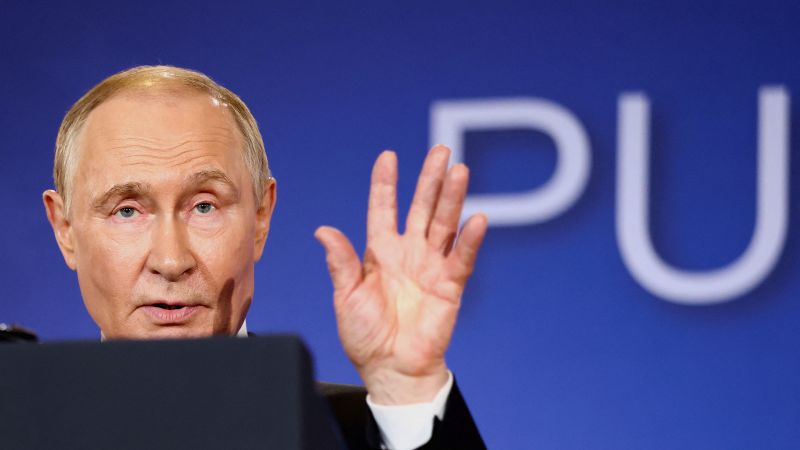Russian President Vladimir Putin’s final words at the Alaska summit were delivered with a smile, spoken in an unusual burst of English.
“And next time in Moscow,” Putin said – no translation needed – in response to US President Donald Trump suggesting they would see each other again very soon.
Putin has been known to give casual side comments and niceties in foreign languages. He also said “thank you so much” in English at the end of his summit with Trump, which concluded without a deal to end the war in Ukraine.
But typically, the Russian leader – a former intelligence officer with the Soviet Union’s security service, the KGB – uses translators to avoid speaking in English during diplomatic conversations.
Putin is known to be fluent in German. During his days as a KGB officer during the Cold War, Putin was posted to Dresden, which was then East Germany. Putin and former chancellor of Germany Angela Merkel were known to speak German to each other during their meetings.
He also speaks good English, according to the Kremlin itself.
In May, when the two leaders spoke on the phone, Kremlin spokesman Dmitry Peskov said that Putin was able to get an impression of what Trump was saying before his interpreter relayed a translation to him, according to Russian state media TASS.
That suggests he was likely able to understand his US counterpart when the pair traveled together briefly in Trump’s presidential limo after their arrival in Alaska on Friday.
Back in 2017, the Kremlin said that Putin understands English “almost completely” and even corrects his interpreters, according to Russia’s Izvestia newspaper.
When he is “on the go,” Putin “most often speaks English, but when negotiations are conducted and when an official meeting is taking place, of course, he communicates through interpreters,” Peskov said, the paper reported at the time.
“I myself have been translating at the highest level for a long time, so I know what kind of stress it is,” Peskov said, according to Izvestia.
Using interpreters at high-level meetings also allows leaders room for maneuver.
For example, ahead of the talks with Trump, Putin seemingly did not understand or hear the uncomfortable questions shouted in English by the press about the war, none of which he addressed, making confused expressions instead.
Asked whether he would “stop killing civilians,” Putin appeared to gesture that he couldn’t hear the question.
There are quite a few examples of the Russian leader showcasing his language skills outside of negotiation rooms.
He gave an exclusive interview to CNN in 2008 about the conflict in Georgia, in which he spoke in part in English.
In 2013, he delivered a fairly long on-camera statement in English to announce Russia’s bid to host the 2020 World Expo in the central city of Yekaterinburg. “It will be a priority national project,” he said in Russian-accented English in the two-and-a-half-minute clip.

In perhaps the most famous display of his English-language proficiency, he once gave a rendition of “Blueberry Hill” at a charity gala in St. Petersburg in 2010, although he stumbled over some of the words. Some Hollywood celebrities, including Kevin Costner, Goldie Hawn and Kurt Russell, were in the audience to witness the rare performance.
During a video conference earlier this year, he responded in fluent German to a German man who was seeking citizenship in Russia. After switching to German, Putin made small talk about his time living in what was East Germany, causing other officials in the meeting to chuckle.
On Friday, Trump responded quickly to Putin’s English-language invitation for another round of meetings in Moscow, saying: “Ooh, that’s an interesting one. I don’t know, I’ll get a little heat on that one, but I could see it possibly happening. Thank you very much, Vladimir.”

